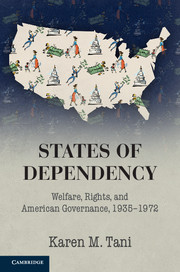Crossref Citations
This Book has been
cited by the following publications. This list is generated based on data provided by Crossref.
DUNNING, CLAIRE
2018.
Outsourcing Government: Boston and the Rise of Public–Private Partnerships.
Enterprise & Society,
Vol. 19,
Issue. 4,
p.
803.
Coates, Benjamin A.
2018.
The Secret Life of Statutes: A Century of the Trading with the Enemy Act.
Modern American History,
Vol. 1,
Issue. 2,
p.
151.
Erkulwater, Jennifer L.
2019.
Constructive Welfare: The Social Security Act, the Blind, and the Origins of Political Identity among People with Disabilities, 1935–1950.
Studies in American Political Development,
Vol. 33,
Issue. 1,
p.
110.
Weinrib, Laura
2019.
AGAINST INTOLERANCE: THE RED SCARE ROOTS OF LEGAL LIBERALISM.
The Journal of the Gilded Age and Progressive Era,
Vol. 18,
Issue. 1,
p.
7.
Fontaine, Philippe
and
Pooley, Jefferson D.
2020.
Society on the Edge.
Michener, Jamila
2020.
Race, Politics, and the Affordable Care Act.
Journal of Health Politics, Policy and Law,
Vol. 45,
Issue. 4,
p.
547.
Katz, Stanley N.
and
Reisman, Leah
2020.
Impact of the 2020 crises on the arts and culture in the United States: The effect of COVID-19 and the Black Lives Matter movement in historical context.
International Journal of Cultural Property,
Vol. 27,
Issue. 4,
p.
449.
Grisinger, Joanna L.
2020.
“South Africa is the Mississippi of the world”: Anti-Apartheid Activism through Domestic Civil Rights Law.
Law and History Review,
Vol. 38,
Issue. 4,
p.
843.
Williams, Mason B.
2020.
How states shaped postwar America: state government and urban power.
Planning Perspectives,
Vol. 35,
Issue. 2,
p.
390.
Galvin, Daniel J.
and
Hacker, Jacob S.
2020.
The Political Effects of Policy Drift: Policy Stalemate and American Political Development.
Studies in American Political Development,
Vol. 34,
Issue. 2,
p.
216.
Lobban, Michael
2021.
Imperial Incarceration.
Nséké Missé, Antoine
2021.
Les coupons alimentaires de l’État-providence. Écrire au sujet du programme Food Stamps aux États-Unis (1966-1975).
Tracés,
p.
103.
BEZARK, MICHELLE
2021.
“Our arithmetic was unique”: The Sheppard-Towner Act and the Constraints of Federalism on Data Collection Before the New Deal.
Journal of Policy History,
Vol. 33,
Issue. 2,
p.
183.
TerBeek, Calvin
2021.
The Search for an Anchor: Living Constitutionalism from the Progressives to Trump.
Law & Social Inquiry,
Vol. 46,
Issue. 3,
p.
860.
Ramanathan, Kumar
2021.
From civil rights to social policy: the political development of family and medical leave policy.
Studies in American Political Development,
Vol. 35,
Issue. 2,
p.
173.
Fox, Cybelle
2021.
Save Our Senior Noncitizens: Extending Old Age Assistance to Immigrants in the United States, 1935–71.
Social Science History,
Vol. 45,
Issue. 1,
p.
55.
Auerbach, Sascha
2021.
Armed with Sword and Scales.
COLBROOK, STEPHEN
2022.
Clandestine Networks and Closeted Bureaucrats: AIDS and the Forming of a Gay Policy Network in California.
Journal of Policy History,
Vol. 34,
Issue. 1,
p.
60.
Stoesz, David
2022.
Human Service Cartels: The Soft Repression of the Mediocracy.
Research on Social Work Practice,
Vol. 32,
Issue. 6,
p.
687.
Myers, William M.
and
Downey, Davia C.
2023.
Face mask mandates: Unilateral authority and gubernatorial leadership in US states.
Law & Policy,
Vol. 45,
Issue. 3,
p.
353.



